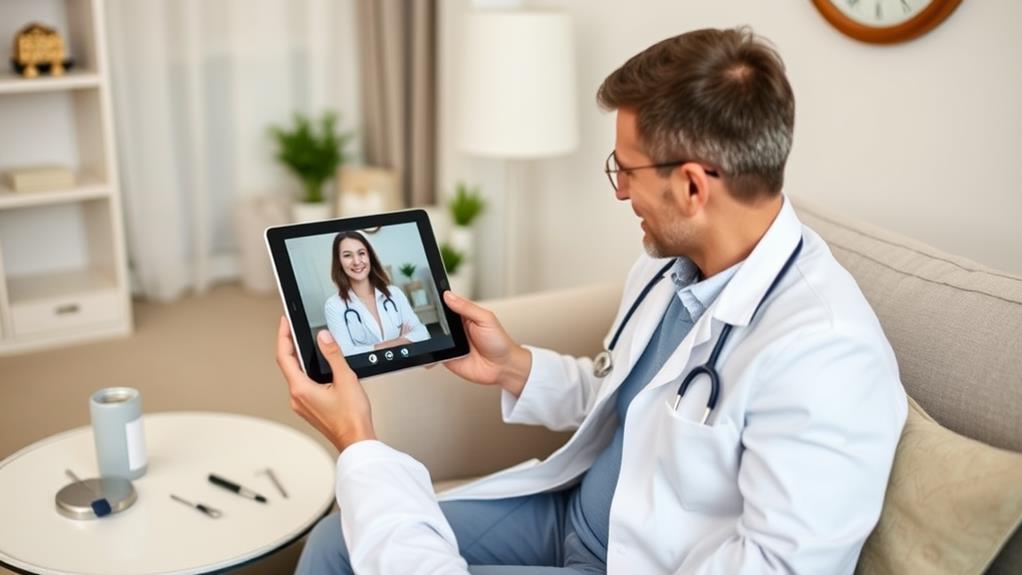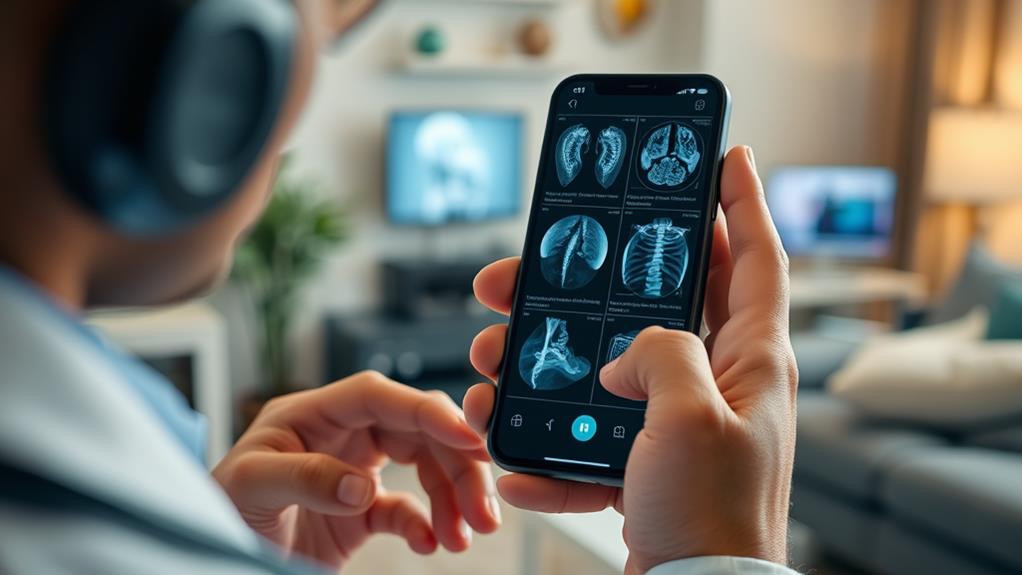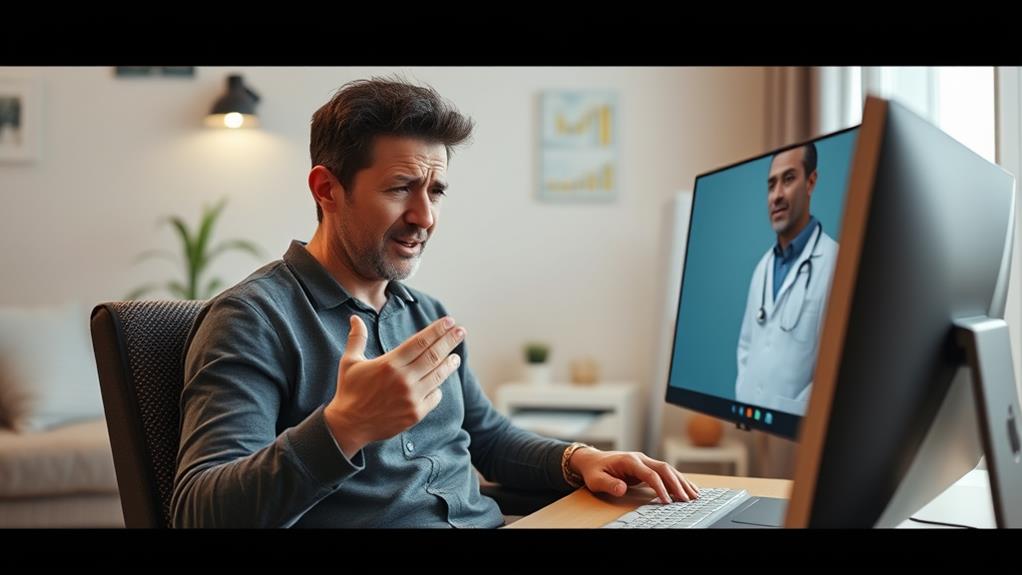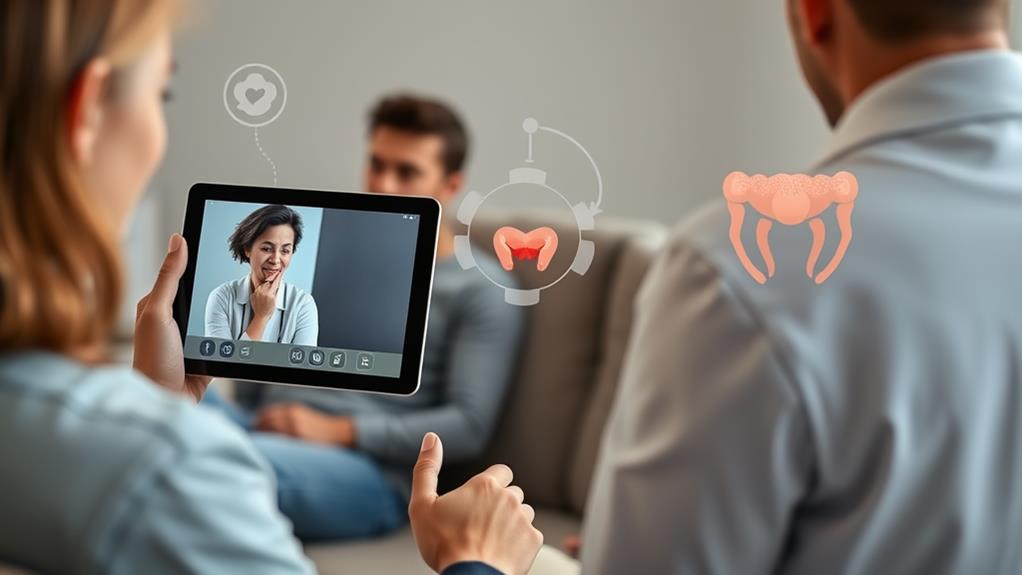As an Amazon Associate I earn from qualifying purchases.
Telemedicine offers a convenient and discreet way to manage hemorrhoid care from home. You'll start with an online health questionnaire and may need to submit photos. A video consultation with a healthcare professional follows, where they'll discuss your symptoms and treatment options. Prescription medications, like HCA Hemorrhoid Cream, can be prescribed remotely. You'll also learn about self-care techniques and lifestyle changes to manage your condition. While telemedicine is beneficial for many, it has limitations. Severe symptoms or complications may require in-person care. Understanding when to seek traditional medical attention is vital for your hemorrhoid treatment journey.
Benefits of Telemedicine for Hemorrhoids

Offering a range of advantages, telemedicine has revolutionized hemorrhoid care. You can now receive medical attention for your rectal symptoms from the comfort of your own home, eliminating the need for in-person visits to a doctor's office. This convenient approach to hemorrhoid treatment allows you to connect with healthcare professionals quickly and easily, reducing wait times and improving access to care, especially if you have a busy schedule or limited mobility.
Telemedicine platforms often provide flexible scheduling options, enabling you to book appointments at times that suit you best. This flexibility is particularly beneficial if you're experiencing sudden or severe hemorrhoid pain. Virtual consultations can also help alleviate feelings of embarrassment or anxiety you might have when discussing sensitive health issues like hemorrhoids with your doctor.
Virtual Consultation Process
When you begin the virtual consultation process for hemorrhoid care, you'll typically start by completing an initial health questionnaire. You may be asked to submit photos of the affected area, following specific guidelines provided by the healthcare platform. Once your information is reviewed, you'll proceed to a video visit with a board-certified doctor or nurse practitioner to discuss your symptoms and treatment options.
Initial Health Questionnaire
The cornerstone of a successful telemedicine consultation for hemorrhoid care is a thorough initial health questionnaire. You'll need to provide detailed information about your symptoms, medical history, and current medications. This questionnaire helps your healthcare provider assess your condition and determine the most appropriate treatment plan.
When completing the questionnaire, be sure to include:
| Information to Provide | Why It's Important |
|---|---|
| Symptom duration | Helps determine acuity |
| Pain level | Guides treatment approach |
| Bleeding occurrence | Indicates severity |
| Previous treatments | Informs next steps |
| Family history | Assesses risk factors |
Your answers will help the healthcare provider decide whether you need to see a primary care physician in person or if they can provide temporary relief through a prescription. Be honest and thorough in your responses to guarantee the best possible care.
Photo Submission Guidelines
A crucial component of the virtual consultation process for hemorrhoid care is the submission of high-quality photos. When you're seeking treatment for hemorrhoids through telemedicine, your healthcare professionals rely on these images to make an accurate diagnosis and develop an effective treatment plan.
To guarantee the best possible care, follow these photo submission guidelines:
- Take clear, well-lit photos from multiple angles to provide a thorough view of the affected area.
- Use a format like JPEG or PNG that's easily viewable and shareable.
- Verify images are in focus and free from obstructions or unnecessary objects.
Video Visit Procedure
Now that you've captured clear, high-quality photos, you're ready for the next step in your telemedicine journey: the video visit. This virtual consultation allows you to connect with a board-certified doctor or nurse practitioner from the comfort of your home. To begin, you'll need to request an appointment through the telehealth platform.
During your video visit, you'll discuss your symptoms, medical history, and any relevant health information with your healthcare provider. This process closely mimics an in-person office visit, but without the need to travel. Your medical provider will use this information to diagnose your condition and prescribe appropriate treatment.
Rest assured that your privacy is protected, as the video visit takes place on a secure, HIPAA-compliant platform. You can expect to receive a diagnosis and treatment plan, including any necessary prescriptions, during your virtual consultation. After the appointment, you can pick up your medication at a nearby pharmacy.
The benefits of telemedicine extend beyond the initial consultation. Follow-up care and monitoring are available through the platform, allowing you to stay connected with your healthcare provider and track your progress remotely.
Diagnosing Hemorrhoids Remotely

Telemedicine has revolutionized the way healthcare professionals diagnose hemorrhoids from afar. Through online platforms, you can receive a remote diagnosis without an in-person visit. Healthcare providers use various methods to assess your condition, including:
- Reviewing health questionnaires
- Examining submitted pictures
- Conducting online video visits
These tools allow them to diagnose both internal hemorrhoids, which rarely cause pain until they prolapse, and external hemorrhoids, which can lead to anal itching, hard lumps near the anus, pain, and rectal bleeding.
During the initial online visit, a licensed healthcare professional will evaluate your symptoms and provide a diagnosis. If necessary, they can prescribe temporary relief with prescription strength hemorrhoid cream. This process increases access to affordable healthcare and eliminates the need for an in-person office visit.
Telemedicine platforms like LifeMD use proprietary technology to facilitate remote diagnoses and treatment of hemorrhoids. By leveraging these services, you can receive an exhaustive treatment plan from the comfort of your home. Remember, while telemedicine offers convenient care, it is vital to follow up with an in-person visit if your symptoms persist or worsen.
Prescription Medications for Hemorrhoids
You'll find several prescription medications available for hemorrhoid treatment, each with varying levels of effectiveness and potential side effects. Prescription-strength HCA Hemorrhoid Cream is a common option that can provide temporary relief, but it's important to be aware of possible adverse reactions. Through telemedicine platforms, you can often obtain these prescriptions online, but remember that a physical examination is vital for proper diagnosis and long-term management.
Common Prescription Medications
Through telemedicine consultations, healthcare professionals can prescribe effective medications for hemorrhoid relief. When you're experiencing pain or bleeding from hemorrhoids, prescription medications can provide temporary respite. Your healthcare professional will determine the best medical treatment based on your symptoms and medical history. Common prescription medications for hemorrhoids include:
- Anusol-HC
- Preparation H
- Proctosedyl
These medications can be easily picked up at your local pharmacy after your online consultation. While they offer relief, it's important to remember that long-term management often requires lifestyle changes and home remedies.
In addition to prescription treatments, you might find relief with over-the-counter options. Pain relievers like acetaminophen or ibuprofen can help manage discomfort, while stool softeners such as Colace can ease bowel movements and reduce straining. For external hemorrhoids, witch hazel pads or wipes can provide a soothing effect and reduce itching.
Your telemedicine consultation will help determine the most appropriate treatment plan for your specific case. By combining prescription medications with lifestyle adjustments and home remedies, you can effectively manage your hemorrhoid symptoms and improve your quality of life.
Effectiveness and Side Effects
While prescription medications can offer relief from hemorrhoid symptoms, it's important to understand their effectiveness and potential side effects. Commonly prescribed treatments like Anusol-HC, Preparation H, and Proctosedyl can provide temporary relief from pain and discomfort. However, they may cause skin irritation, allergic reactions, or even rectal bleeding in some cases.
Over-the-counter pain relievers can help manage hemorrhoid-related pain, but they come with their own risks, including stomach upset and ulcers. Witch hazel pads offer a soothing effect but may irritate sensitive skin. Stool softeners like Colace can ease bowel movements, reducing strain, but might cause nausea or bloating.
Here's a comparison of common hemorrhoid treatments and their potential side effects:
| Treatment | Effectiveness | Common Side Effects |
|---|---|---|
| Prescription creams | Temporary relief | Skin irritation, allergic reactions |
| OTC pain relievers | Pain management | Stomach upset, ulcers |
| Witch hazel pads | Soothing effect | Skin irritation |
| Stool softeners | Reduces straining | Nausea, bloating |
| HCA Hemorrhoid Cream | Varies by case | Depends on individual |
When considering treatment options, it's vital to consult with a healthcare provider for personalized medical advice tailored to your specific symptoms and medical history.
Obtaining Prescriptions Online
Telemedicine has revolutionized the way patients can obtain prescriptions for hemorrhoid treatments. You can now book a telehealth appointment with a board-certified doctor or nurse practitioner without needing insurance. These healthcare professionals can provide a diagnosis and treatment plan tailored to your specific needs.
During your online consultation, the healthcare professional will determine the best medication for your hemorrhoid treatment. They can prescribe various options, including:
- Anusol-HC
- Preparation H
- Proctosedyl
These medications can be picked up at a nearby pharmacy or, in some cases, delivered directly to your home. Platforms like LifeMD allow you to schedule appointments at convenient times, making it easier to access care when you need it most.
It's important to note that while telemedicine offers a convenient solution for obtaining prescriptions, it may be temporary. Some healthcare providers recommend an in-person office visit and rectal examination for a more thorough assessment. However, online prescriptions for medications like HCA Hemorrhoid Cream can provide relief until you can schedule an in-person appointment. This approach guarantees you receive timely treatment while maintaining the option for more in-depth care when necessary.
Self-Care Techniques and Lifestyle Changes

Many people can effectively manage hemorrhoids through simple self-care techniques and lifestyle changes. To prevent hemorrhoids or reduce their symptoms, you'll want to focus on improving your diet and daily habits. Start by incorporating a high-fiber diet into your routine, which can help prevent straining during bowel movements. This, in turn, reduces the risk of developing or worsening hemorrhoids.
Make sure you're drinking plenty of water throughout the day to keep your stools soft and easy to pass. Regular physical activity, such as walking or jogging, can also improve bowel function and lower your risk of hemorrhoids. Avoid sitting for extended periods by taking regular breaks to stand up and stretch, which helps reduce pressure on the rectal veins.
Practicing good bowel habits is vital. Don't delay bowel movements when you feel the urge, as this can lead to constipation and increase the likelihood of straining. By making these lifestyle changes, you can effectively manage and prevent hemorrhoids without relying solely on medical interventions. Remember, these self-care techniques not only help with hemorrhoids but also contribute to your overall digestive health and well-being.
Follow-Up Care Through Telemedicine
After implementing self-care techniques and lifestyle changes, you may need ongoing support to manage your hemorrhoids effectively. Telemedicine offers a convenient solution for follow-up care, allowing you to receive treatment and monitoring from the comfort of your home. Through virtual consultations, your healthcare provider can review your symptoms, assess treatment progress, and adjust your care plan as needed.
Telemedicine platforms often provide secure messaging systems, enabling you to communicate with your provider between visits. This continuous support is particularly beneficial if you:
- Live in a rural or remote area
- Have limited mobility
- Struggle to attend in-person appointments due to a busy schedule
Remote monitoring through telemedicine allows your healthcare provider to track your progress, identify potential complications, and intervene promptly to prevent worsening of your hemorrhoid symptoms. This approach guarantees you receive timely adjustments to your treatment plan, medication changes, and ongoing guidance for managing your condition.
Limitations of Virtual Hemorrhoid Treatment

Despite its numerous advantages, virtual hemorrhoid treatment comes with several vital limitations. First and foremost, telemedicine can't replace a physical exam. You'll still need to undergo anoscopy, sigmoidoscopy, or colonoscopy as soon as possible for an exhaustive evaluation.
Insurance coverage is another concern. Your plan may not cover telemedicine services for hemorrhoid care, potentially leading to high out-of-pocket costs. Additionally, if you're experiencing severe symptoms like bleeding, severe pain, or fecal incontinence, virtual treatment may not be suitable. These conditions require immediate medical attention that telemedicine can't provide.
Access to prescription medications can be limited through virtual platforms. You might need to wait for a physical exam before receiving necessary prescriptions. Moreover, telemedicine isn't equipped to handle emergency situations. If your symptoms worsen during virtual treatment, you'll need to seek in-person medical care promptly.
It's essential to understand these limitations when considering telemedicine for hemorrhoid care. While it offers convenience and accessibility, it's not a one-size-fits-all solution. Always prioritize your health and safety, and don't hesitate to seek in-person medical attention when necessary.
When to Seek In-Person Care
While telemedicine offers convenience for hemorrhoid care, certain situations demand in-person medical attention. You should see a doctor immediately if you experience severe pain, bleeding during bowel movements, or loss of bowel control. These symptoms could indicate a more serious condition that requires urgent treatment.
It's vital to seek immediate medical attention if:
- You notice a large amount of blood in your stool or sudden onset of severe pain
- You're having difficulty examining yourself or are uncertain about your symptoms
- Your symptoms persist or get worse despite trying home remedies
In these cases, an in-person examination is necessary to rule out other conditions and provide an accurate diagnosis. A doctor can physically assess the affected area, which is often more effective than a virtual consultation.
Frequently Asked Questions
How Do I Prepare for a Hemorrhoid Appointment?
Prepare for your hemorrhoid appointment by keeping a symptom journal, tracking your symptoms, and prepping questions. Gather your medical history, insurance info, and comfort items. Address personal hygiene concerns and bring up any doctor concerns you have.
What to Expect at a Hemorrhoid Consultation?
During a hemorrhoid consultation, you'll discuss your medical history and symptoms. The doctor will ask questions, perform a virtual exam, and review treatment options. They'll address your concerns and consider your personal preferences for hemorrhoid diagnosis and care.
What Will Urgent Care Do for Hemorrhoids?
An ounce of prevention is worth a pound of cure. At urgent care, you'll receive quick relief for hemorrhoid symptoms. They'll perform a virtual exam, prioritize pain management, and provide emergency care if needed. Digital diagnosis enables urgent treatment.
How Do You Know When a Hemorrhoid Needs Medical Attention?
You should seek medical attention if you experience severe bleeding, prolonged pain, persistent anal itching, fecal incontinence, or large hemorrhoids. Watch for rectal pain, blood clots, or sudden onset of symptoms. Don't ignore these warning signs.
Conclusion
You've now got the lowdown on telemedicine for hemorrhoid care. It's a game-changer, offering convenience and privacy. While virtual consultations can't replace all in-person visits, they're a groovy way to get initial advice and follow-up care. Remember, self-care and lifestyle changes are key. Don't hesitate to seek in-person treatment if symptoms worsen. With telemedicine, you're just a click away from expert hemorrhoid care. Stay cool and keep your bottom happy!
Amazon and the Amazon logo are trademarks of Amazon.com, Inc, or its affiliates.
